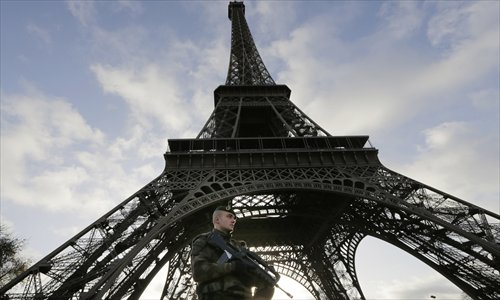HOME >> WORLD
Police hunt eighth suspect
Source:Agencies-Global Times Published: 2015-11-16 0:58:01
France could ‘swing right’ after terror atrocity: expert

A French soldier stands guard at the Eiffel Tower which remained closed on the first of three days of national mourning in Paris on Sunday. Thousands of French troops were deployed around Paris on Sunday and tourist sites stood shuttered in one of the most visited cities on Earth, while investigators questioned the relatives of a suspected suicide bomber involved in the country's deadliest violence since World War II. Photo: AP
As French police on Sunday continued to hunt down the eighth suspect and investigate the attacks in Paris that had so far killed 129 people, concerns are being raised over how the worst terror attacks in France since World War II could change the political dynamics of the country as well as Europe.Paris prosecutor Francois Molins told reporters on Sunday that three jihadist cells staged coordinated hits on Friday night at bars, a concert hall and soccer stadium, killing 129 people and injuring 352, including 99 who were in a serious condition.
Prosecutors have said the slaughter - claimed by the Islamic State as revenge for French military action in Syria and Iraq - appeared to involve a multinational team with links to the Middle East, Belgium and possibly Germany as well as home-grown French roots.
Belgian police have detained seven people following raids in Brussels during the weekend. Belgium prosecutors said Sunday two of the Paris assailants had been living in Belgium and they were among the killers who died during Friday's attacks.
Meanwhile, the holder of a Syrian passport found near the body of one of the gunmen who died in Friday night's attacks was registered as a refugee in several European countries last month, authorities said.
The man came into Europe through the Greek island of Leros, where he was processed on October 3, Greek officials said on Saturday.
In a separate report, CNN named the man as Ahmad al Mohammad and said he was one of the three suicide bombers at the State de France on Friday.
Seven gunmen, all of whom were wearing suicide vests packed with explosives, died in the multiple assaults. The first to be identified was named as Ismael Omar Mostefai, a 29-year-old who lived in the city of Chartres, southwest of Paris.
French media said he was French-born and of Algerian descent. Molins said the man had a security file for Islamist radicalization, adding that he had a criminal record but had never spent time in jail. He was identified through tests on his severed finger.
A judicial source said Mostefai's father and brother had been taken in for questioning, along with other people believed to be close to him.
Another source said police had found a car in a suburb east of Paris that was believed to have been used in the assault, suggesting that at least one of the attackers had escaped.
France was the first European state to join US air strikes against Islamic State targets in Iraq in September 2014.
Political implications
Analysts said the Paris attacks could change the political dynamics of France as it had already re-ignited a row over Europe's refugee crisis.
"It is very likely that French politics will 'turn right' after the assaults. Hollande had already denounced the strikes as an act of war and vowed to destroy the Islamic State, a signal of major policy change in France," Zheng Ruolin, an expert on French Studies, told the Global Times.
France's far-right National Front party leader Marine Le Pen said on Saturday that France must "annihilate" Islamist radicals and regain control of its borders.
Polls have been suggesting that Le Pen, known for her strong speeches against immigration, is likely to win regional elections in northern France in December. Surveys also see her making it to the second round of the presidential election in 2017, although losing the run-off.
Zheng said that if the far-right forces win the upcoming regional election in December, it will polarize French society.
Sacrilege to use God's name
After the deadly attacks in Paris, Pope Francis said on Sunday that using God's name to justify violence was sacrilege.
"I want to firmly repeat that the path of violence and hate does not resolve humanity's problems, and using the name of God to justify this path is blasphemy," the pope told thousands of pilgrims in St. Peter's Square.
The names of the first victims have started to filter out on social media, many of them young people who were out enjoying themselves on a Friday night.
The dead included one US citizen, one Swede, one Briton, one German, two Belgians, two Romanians and two Mexicans, their governments said.
No Chinese person was killed in the assaults. One Chinese national was slightly injured, the Xinhua News Agency reported.
Posted in: Europe